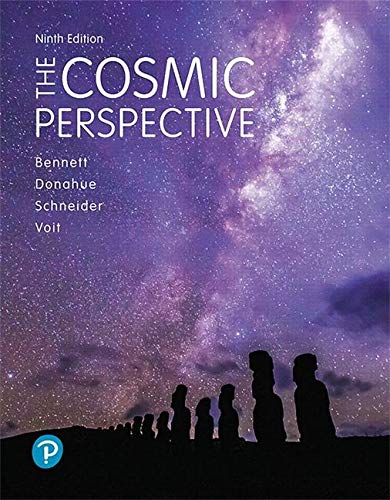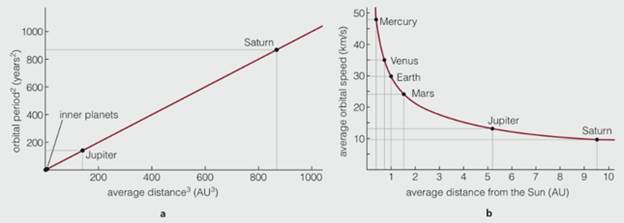
The Cosmic Perspective (9th Edition)
9th Edition
ISBN: 9780134874364
Author: Jeffrey O. Bennett, Megan O. Donahue, Nicholas Schneider, Mark Voit
Publisher: PEARSON
expand_more
expand_more
format_list_bulleted
Textbook Question
Chapter 3, Problem 4VSC
Use the following questions to check your understanding of some of the many types of visual information used in astronomy. For additional practice, try the Chapter 3 Visual Quiz at MasteringAstronomy®.

Study the two graphs above, based on Figure 3.19. Use the information in the graphs to answer the following questions.
4. Kepler's third law is often stated as p2= a3. The value a3for a planet is shown on
a. the horizontal axis of graph a.
b. the vertical axis of graph a.
c. the horizontal axis of graph b.
d. the vertical axis of graph b.
Expert Solution & Answer
Want to see the full answer?
Check out a sample textbook solution
Students have asked these similar questions
Imagine you are out for a stroll on a sunny day when you encounter a lake. Unpolarized light from the sun is reflected off the lake into your eyes. However, you notice when you put on your vertically polarized sunglasses, the light reflected off the lake no longer reaches your eyes. What is the angle between the unpolarized light and the surface of the water, in degrees, measured from the horizontal? You may assume the index of refraction of air is nair=1 and the index of refraction of water is nwater=1.33 . Round your answer to three significant figures. Just enter the number, nothing else.
Deduce what overvoltage is like in reversible electrodes.
pls help on these
Chapter 3 Solutions
The Cosmic Perspective (9th Edition)
Ch. 3 - Prob. 1VSCCh. 3 - Use the following questions to check your...Ch. 3 - Use the following questions to check your...Ch. 3 - Use the following questions to check your...Ch. 3 - Use the following questions to check your...Ch. 3 - Prob. 6VSCCh. 3 - Prob. 7VSCCh. 3 - Prob. 1EAPCh. 3 - Why did ancient peoples study astronomy? Describe...Ch. 3 - Describe the astronomical origins of our day,...
Ch. 3 - What is a lunar calendar? How can it be kept...Ch. 3 - What do we mean by a model in science?Ch. 3 - Summarize the development of the Greek geocentric...Ch. 3 - What was the Copernican revolution, and how did it...Ch. 3 - 8. What is an ellipse? Define its foci, semimajor...Ch. 3 - 9. State and explain the meaning of each of...Ch. 3 - Describe the three hallmarks of science and how we...Ch. 3 - 11. What is the difference between a hypothesis...Ch. 3 - What is the basic idea behind astrology? Explain...Ch. 3 - Science or Nonscience? Each of the following...Ch. 3 - Science or Nonscience? Each of the following...Ch. 3 - Science or Nonscience?
Each of the following...Ch. 3 - Science or Nonscience?
Each of the following...Ch. 3 - Science or Nonscience?
Each of the following...Ch. 3 - Science or Nonscience? Each of the following...Ch. 3 - Science or Nonscience? Each of the following...Ch. 3 - Science or Nonscience?
Each of the following...Ch. 3 - Science or Nonscience?
Each of the following...Ch. 3 - Science or Nonscience? Each of the following...Ch. 3 - In the Greek geocentric model, the retrograde...Ch. 3 - Which of the following was not a major advantage...Ch. 3 - When we say that a planet has a highly eccentric...Ch. 3 - Earth is closer to the Sun in January than in...Ch. 3 - According to Kepler’s third law, (a) Mercury...Ch. 3 - Tycho Brahe’s contribution to astronomy included...Ch. 3 - Galileo’s contribution to astronomy included (a)...Ch. 3 - Which of the following is not true about...Ch. 3 - Which of the following is not true about a...Ch. 3 - When Einstein’s theory of gravity (general...Ch. 3 - What Makes It Science? Choose a single idea in the...Ch. 3 - Prob. 35EAPCh. 3 - Prob. 36EAPCh. 3 - Prob. 37EAPCh. 3 - Earth’s Shape. It took thousands of years for...Ch. 3 - Prob. 40EAPCh. 3 - Copernican Players. Using a bulleted-list format,...Ch. 3 - Prob. 44EAPCh. 3 - The Metonic Cycle. The length of our calendar year...Ch. 3 - Chinese Calendar. The traditional Chinese lunar...Ch. 3 - Method of Eratosthenes I. You are an astronomer on...Ch. 3 - Method of Eratosthenes II. You are an astronomer...Ch. 3 - Mars Orbit. Find the perihelion and aphelion...Ch. 3 - Eris Orbit. The dwarf planet Eris orbits the Sun...Ch. 3 - New Planet Orbit. A newly discovered planet orbits...Ch. 3 - Halley Orbit. Halley’s Comet orbits the Sun every...
Knowledge Booster
Learn more about
Need a deep-dive on the concept behind this application? Look no further. Learn more about this topic, physics and related others by exploring similar questions and additional content below.Similar questions
- pls help on thesearrow_forward20. Two small conducting spheres are placed on top of insulating pads. The 3.7 × 10-10 C sphere is fixed whie the 3.0 × 107 C sphere, initially at rest, is free to move. The mass of each sphere is 0.09 kg. If the spheres are initially 0.10 m apart, how fast will the sphere be moving when they are 1.5 m apart?arrow_forwardpls help on allarrow_forward
- 19. Mount Everest, Earth's highest mountain above sea level, has a peak of 8849 m above sea level. Assume that sea level defines the height of Earth's surface. (re = 6.38 × 106 m, ME = 5.98 × 1024 kg, G = 6.67 × 10 -11 Nm²/kg²) a. Calculate the strength of Earth's gravitational field at a point at the peak of Mount Everest. b. What is the ratio of the strength of Earth's gravitational field at a point 644416m below the surface of the Earth to a point at the top of Mount Everest? C. A tourist watching the sunrise on top of Mount Everest observes a satellite orbiting Earth at an altitude 3580 km above his position. Determine the speed of the satellite.arrow_forwardpls help on allarrow_forwardpls help on allarrow_forward
- 6. As the distance between two charges decreases, the magnitude of the electric potential energy of the two-charge system: a) Always increases b) Always decreases c) Increases if the charges have the same sign, decreases if they have the opposite signs d) Increases if the charges have the opposite sign, decreases if they have the same sign 7. To analyze the motion of an elastic collision between two charged particles we use conservation of & a) Energy, Velocity b) Momentum, Force c) Mass, Momentum d) Energy, Momentum e) Kinetic Energy, Potential Energyarrow_forwardpls help on all asked questions kindlyarrow_forwardpls help on all asked questions kindlyarrow_forward
arrow_back_ios
SEE MORE QUESTIONS
arrow_forward_ios
Recommended textbooks for you
 Foundations of Astronomy (MindTap Course List)PhysicsISBN:9781337399920Author:Michael A. Seeds, Dana BackmanPublisher:Cengage Learning
Foundations of Astronomy (MindTap Course List)PhysicsISBN:9781337399920Author:Michael A. Seeds, Dana BackmanPublisher:Cengage Learning Stars and Galaxies (MindTap Course List)PhysicsISBN:9781337399944Author:Michael A. SeedsPublisher:Cengage Learning
Stars and Galaxies (MindTap Course List)PhysicsISBN:9781337399944Author:Michael A. SeedsPublisher:Cengage Learning
 AstronomyPhysicsISBN:9781938168284Author:Andrew Fraknoi; David Morrison; Sidney C. WolffPublisher:OpenStax
AstronomyPhysicsISBN:9781938168284Author:Andrew Fraknoi; David Morrison; Sidney C. WolffPublisher:OpenStax Horizons: Exploring the Universe (MindTap Course ...PhysicsISBN:9781305960961Author:Michael A. Seeds, Dana BackmanPublisher:Cengage Learning
Horizons: Exploring the Universe (MindTap Course ...PhysicsISBN:9781305960961Author:Michael A. Seeds, Dana BackmanPublisher:Cengage Learning

Foundations of Astronomy (MindTap Course List)
Physics
ISBN:9781337399920
Author:Michael A. Seeds, Dana Backman
Publisher:Cengage Learning

Stars and Galaxies (MindTap Course List)
Physics
ISBN:9781337399944
Author:Michael A. Seeds
Publisher:Cengage Learning


Astronomy
Physics
ISBN:9781938168284
Author:Andrew Fraknoi; David Morrison; Sidney C. Wolff
Publisher:OpenStax

Horizons: Exploring the Universe (MindTap Course ...
Physics
ISBN:9781305960961
Author:Michael A. Seeds, Dana Backman
Publisher:Cengage Learning

Time Dilation - Einstein's Theory Of Relativity Explained!; Author: Science ABC;https://www.youtube.com/watch?v=yuD34tEpRFw;License: Standard YouTube License, CC-BY